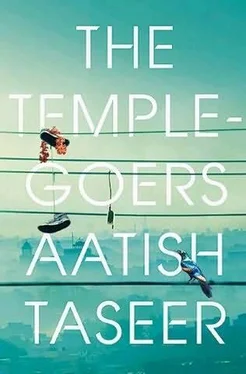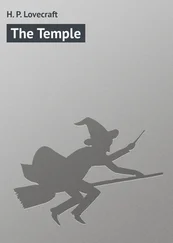I had returned to see her bathed and in her nightdress. Vatsala had woken up and was tending to her, cleaning her wounds with Dettol, making her tea. Sanyogita was quiet, and even smiled when she saw me, but Vatsala looked fearfully up at me, like a dog who had just been beaten. Whenever I looked back at her, she’d hurriedly lower her head. But as soon as I turned away, I felt her eyes follow me. She packed Sanyogita’s bag while I lay on the bed, making a point of taking down all her best suitcases, jewellery and shawls. She gave a short family history of each article, as if reminding me that Sanyogita was not alone, not without people. Just as we were about to go to bed, she tumbled in with her bedding, wanting to spend the night on the floor next to Sanyogita.
‘Vatsala,’ Sanyogita said, laughing, ‘it wasn’t him.’
‘Bebi,’ she said aghast, ‘then who?’
‘Just someone. But don’t worry about it. You don’t have to sleep here.’
Vatsala folded up her bed, smiled apologetically and crept away.
That night I received a number of text messages. At two a.m. in three instalments: ‘What I’ve done tonight can never be forgiven or forgotten. I think of you as my brother. I’ve had an amazing time with you in these past few months. I wanted us to be friends for life, but destiny had other plans. Please from now on, don’t call me, don’t text for a long, long time. I can’t be your trainer, but I will organize someone for you when you come back. I hope one day Sanyogita will find it in her heart to forgive me for what I have done. She will always be my bhabi. Ash-man.’ I replied, ‘Don’t be so filmy, just send her some flowers in the morning.’ At three a.m.: ‘Man, not giving film lines. If she forgives me, I’m happiest man in the world. What are her favourite flowers?’ ‘Lilies,’ I replied. At five a.m.: ‘My dear Megha, tonight I have lost my best friend in the world. Now, you are all that I have in the world. Your boyf, Aakash.’ ‘Huh?’ I replied. ‘Who’s Megha?’ No reply.
And it was like this that I discovered what, if my mind had been clearer in those last days in Delhi, I would have seen anyway: Aakash had found a girl. The next morning, just as we were leaving, the chowkidar brought up a little cane basket containing a great deal of fern and foliage, six pink gladioli and a note of apology in neat, rounded writing.
Months went by though I don’t know how.
The first two were spent in a village in the south of Spain. Sanyogita knew an English family who owned a hotel in the hills above Seville. They were of red earth, covered in orange, cork and olive trees. In the evenings, the long light and the silvery olive trees made the hills appear purple. The sky was cast in one pattern before evening fell. Then no matter how strong the wind in the hills became, it could never put the arrangement of clouds and clear sky out of true. Against the filters of this hung sky, the light distilled into darkness. From the semicircular window of the one-bedroom annexe we rented for 750 euros a month, we could see the white village of Cazalla. The red-tiled roofs on some of its houses were flat, smooth and new; and on others, rounded, mildewed, with browning stalks growing out of them. On all the bell towers and spires, great stork’s nests had appeared. The chattering from them at night, mixed with the croaking of frogs in a field below, and that most Mediterranean of Mediterranean noises, the whirr of a Vespa, kept me awake for hours.
It seemed at first that we had salvaged our relationship. The quality of life and produce in the village was deceptive. It briefly made the small, borrowed idea of our stay in a European village ring true. In the mornings, we’d have breakfast in a shaded bar with high stools. A stern, leather-faced man brought us long pieces of bread with tomatoes, olive oil, garlic, salt and fresh orange juice. We posed as regulars, watching two inches of black coffee drip into clear glasses. The bartender assembled a saucer, a spoon and a large sachet of sugar as the milk heated. His self-assuredness stood out against our pretence; to him it was just another morning, café con leche just coffee with milk. And when the milk had heated, the saucers slid across the bar with a brief clatter. At lunch, in another place with tiles and a high wooden bar, there was fresh fish, salad and giant tomatoes with flakes of salt; all things that we hadn’t tasted during the summer in India. They created the illusion of happiness, of the good life.
But it was also these things, and the settled world they spoke of, that made India recede. For as long as sensual pleasures lasted, it didn’t matter. But when those satisfactions ran out, I realized I had no way into this kind of life. There was no context for Indians in Spain as there was for the English or Americans. The falsity of my situation overwhelmed me. Sometimes, late in the afternoon, I would look out of the semicircular window in disbelief at the cobbled streets and red-tiled roofs. The heat in the village dwarfed the heat of the subcontinent and this also added to my sense of futility. The streets were empty all day but for the occasional figure of an old veiled woman in black. The image might have been emblematic of the little village, perfect down to the late-afternoon blaze on the white houses and the bronze-faced lion spitting spring water into a mossy basin, but I wouldn’t have known; I was on the outside, with too little knowledge, knowledge I took for granted in India, to enter that picture of village life.
I joined the village gym. It was a single room, with modern frosted-glass windows embedded in an old façade. A beefy, middle-aged man who taught spin cycling classes to the women in the village charged me thirty euros for the month. One half of the gym was taken up by old weights machines; the other by the spinners, spinning on through a haze of coloured disco lights and techno music. Teenage Spanish boys, with bad skin and short-sleeved T-shirts, worked out around me, eyeing me with suspicion. A metal wall fan circulated the warm, stale air in the room.
It was after one of these sessions, almost six weeks into my time in the village, that my mobile, now carrying Movistar, beeped with a voice message. I stepped out of the gym. It was seven p.m., but the blaze had not subsided. It was late at night in India; I could hear the beeping of scooters and the tinkle of bicycle bells in the background. ‘How’s you doing, man?’ the voice began in English. ‘I hopes you feeling good, man.’ Then in Hindi, ‘Yaar, I miss you a lot. What’s this going and leaving your friend? Please, man, come back soon. There’s so much fun still to be had. OK, well, call when you get a chance. Your friend, Ash-man. Oh, and please say my sorry one more time to Sanyogita bhabi.’
Walking back through these empty cobbled streets, with their narrow pavements and leather-faced men staring vacantly at me, I knew I had to leave. I just didn’t know how I would tell Sanyogita. Money had become a problem as well. In India my mother had helped me with a small allowance and the few thousand I had left in sterling from my job in London had gone far. The village was cheap, but many times more expensive than India. Every meal was out; Sanyogita always ordered fish; we must have been spending fifty euros a day at an increasingly unfavourable exchange rate. The only hopeful news was that the revised version of my novel was complete. It was not an inspired revision, but I’d had detailed notes and had followed them closely. The manuscript was already with the agent in New York and I was awaiting a reply.
That night at the village casino, which was really just a restaurant with red velvet curtains, deep leather chairs and tiled walls, I tried telling Sanyogita that I needed to go home. But I framed my reasons around my confusion at being in a little village in Spain. Sanyogita seemed receptive. She listened quietly, sipping a small glass of sherry and occasionally wrapping a finger around a piece of acorn-fed ham. When I’d finished, she responded with a sweeping gesture which left me, like with the study, reaching in desperation for adequate feelings.
Читать дальше












